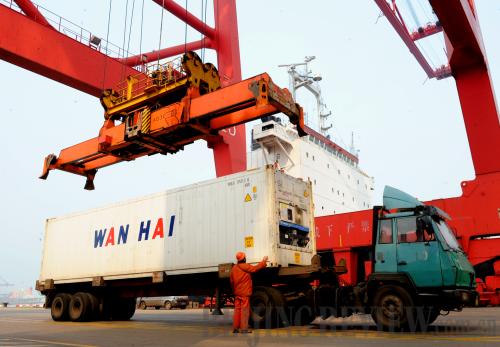|
 |
|
TRADE DEFICIT: A container port in Lianyungang, east China's Jiangsu Province. According to the General Administration of Customs, a trade deficit of $31.48 billion appeared in February, the largest monthly deficit in a decade (GENG YUHE) |

The People's Bank of China, the central bank, widened the trading band for the yuan against the U.S. dollar in April. Now questions about the potential risks facing a more flexible yuan have arisen, most importantly: Are these risks controllable? Mei Xinyu, an associate researcher at the Chinese Academy of International Trade and Economic Cooperation of the Ministry of Commerce, addressed this issue in an article to Beijing Review. Edited excerpts follow:
Enhancing flexibility of the yuan's exchange rate formation mechanism and realizing the yuan's free fluctuation to a large extent have been a long-term goal for the Chinese Government. But the potential risks of increasing exchange rate flexibility should never be overlooked.
History has proven to us that countries with a floating exchange rate have a bigger chance to be hit by financial crises than those with a fixed exchange rate. Moreover, enhanced flexibility of the exchange rate brought by international speculative "hot money" is more harmful for developing countries.
High flexibility can have an extremely adverse effect on the financial market of developing countries, because the value of financial assets denominated in the local currency that residents hold will also fluctuate and residents may turn to assets denominated in foreign currencies. Then, the domestic financial market denominated in the local currency will shrink.
Because of the hidden risks, countries with a floating exchange rate regime have little chance to succeed. China is cautious as it widens the yuan-U.S. dollar trading band, hoping to minimize the side effects of the move.
On April 16, the People's Bank of China widened the trading band for the yuan against the U.S. dollar to 1 percent from 0.5 percent, the latest move after the trading band was widened from 0.3 percent to 0.5 percent in 2007.
Can we control the risks of increased yuan exchange rate flexibility this time? The answer should be yes.
If the yuan's one-way fluctuation (only appreciation or only depreciation) expectation prevails in the foreign exchange market, increasing exchange rate flexibility will make the rate unstable. China didn't dare to rashly widen the trading band in the previous years because both the trend of foreign exchange market and the people's expectations are on the yuan's appreciation.
The central parity for the yuan against the U.S. dollar has appreciated over 30 percent, since China unpegged the yuan to the U.S. dollar and shifted to a managed floating exchange rate regime based on market supply and demand with reference to a basket of currencies in July 21, 2005.
Only when the yuan's exchange rate sees two-way movements can the widening of the trade band avoid causing drastic fluctuation, especially substantial appreciation in the short run which is beyond the endurance ability of China's real economic entities.
In a large country like China, all economic moves in the past, at present and in the future have to rely on its strong real economy.
| 